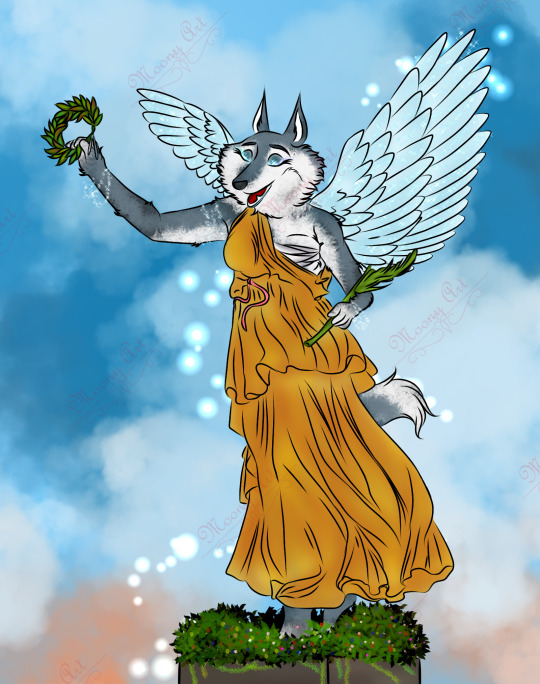#porshathewhitewolf
Text
Series 9 Post 11: I know some of you have been waiting for it, but others are lying to themselves. (?)
Okay, jokes aside here is this adorable chic and sci-fi-loving little wolf~.
The flower I paired with her is Frangipani or Plumeria flower and symbolizes beauty and simplicity, but also romantic love.
In some cultures it represents the connection with the spirit world and lost loved ones.
The inhabitants of the Hawaiian Islands create garlands with these flowers, which they give as a sign of welcome and friendship to tourists.
In Asia, however, it represents immortality, good luck, peace and rebirth.
The reason is linked to its ability to bloom even after the branch it is on has been cut.
In the Maldives, frangipani is sacred and they call it “temple plant” because it is often found near temples and mosques.

#singmovie#sing2#singfanart#illuminationetertainment#porshacrystal#porshasingmovie#porshathewhitewolf#porshathewolf#whitewolf#canoncharacter#cc
9 notes
·
View notes
Text
Series 14 post 2: Our series goes on and, in this PinUp, we cross her on our way. The most glamorous of gray wolves, glamorous and with her head who knows where, Miss Crystal Porsha! 🐺🤍

#singmovie#sing2#singfanart#illuminationetertainment#porshacrystal#porshasingmovie#porshathewhitewolf#whitewolf#canoncharacter#cc
6 notes
·
View notes
Text
Today Porsha Crystal as...
Series 6 Post 14: Goddess and deified personification of victory in peace or war. She first appears during the first Punic War, seemingly as a Romanised re-naming of Nike, the goddess of victory associated with Rome's Greek allies in the Greek mainland and in Magna Graecia. Thereafter she comes to symbolise Rome's eventual hegemony and right to rule. She is a deified abstraction, entitled to cult but unlike Nike, she has virtually no mythology of her own.
🌸 She was worshipped in Magna Graecia and mainland Greece, and was a subject of Greek myth. Around this time, various Roman war-deities begin to receive the epithet victor (conqueror) or invictus (unconquered).
🌸 Other images show her as human-sized, driving a triumphal war-chariot, or in free-standing statuary, standing on the right-hand palm of a much larger figure, typically Rome's supreme god, Jupiter, or war-god Mars, or Roma, divine personification of the Roman state.
🌸 Winged figures, very often in pairs, representing victory and referred to as winged victories, are common in Roman official iconography, typically hovering high in a composition, and often filling spaces in spandrels or other gaps in architecture. These represent the "spirit of victory" rather than a full-blown deity. Pairs of winged victories continued to appear after the Christianization of the Roman Empire and gradually evolved into depictions of Christian angels.
🌸 It was used to store war-booty, and it hosted the Magna Mater's statue while her own temple was under construction. Victoria had several other shrines throughout Rome. In Imperial era Timgad, victoria victrix (conquering victory) was given credit for Imperial successes.

#singmovie#sing2#singfanart#illuminationetertainment#porshacrystal#porshasingmovie#porshathewhitewolf#whitewolf#canoncharacter#cc#goddessvictoria#romanmyth#romanpantheon
10 notes
·
View notes